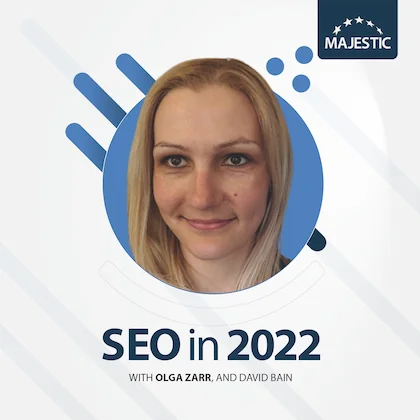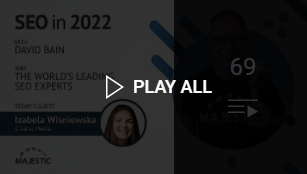-
Site Explorer
- Majestic
- Summary
- Ref Domains
- Backlinks
 New
New Lost
Lost- Context
- Anchor Text
- Pages
- Topics
- Link Graph
- Related Sites
- Advanced Tools
- Author ExplorerBeta
- Summary
- Similar Profiles
- Profile Backlinks
- Attributions
- Compare
-
Link Tools
- My Majestic
- Recent Activity
- Reports
- Campaigns
- Verified Domains
- OpenApps
- API Keys
- Keywords
- Keyword Generator
- Keyword Checker
- Search Explorer
- Link Tools
- Bulk Backlinks
- Neighbourhood Checker
- Submit URLs
- Experimental
- Index Merger
- Link Profile Fight
- Mutual Links
- Solo Links
- PDF Report
- Typo Domain
- Free SEO Tools
-
Support
- Blog

- Support
- Get started
- Tools
- Subscriptions & Billing
- FAQs
- Glossary
- How To Videos
- API Reference Guide

- Contact Us
- About Backlinks and SEO
- SEO in 2024
- Link Building Guides
- Webinars
- Blog
Add Google Search Console to your essential everyday SEO toolkit
Olga Zarr
Another Google data platform that you need to be using on a regular basis, according to Olga, is Google Search Console.

Add Google Search Console to your essential everyday SEO toolkit
Olga says: "Always start any SEO analysis from Google Search Console (GSC). Whenever you land a new client, or undertake an audit of a new site, the first thing you should ask for is access to Google Search Console and go through all of the reports.
For instance, the coverage report will instantly tell you exactly what pages are indexed by Google, so you can take a look at all of them and make sure the right pages are indexed. Maybe there are some pages, like those with single testimonials, for instance, which are part of something bigger, and so shouldn't be indexed. This report is simple to use and will immediately provide you with useful information for your client.
The same is true for excluded pages. You can look at this report to see if there are pages within the 'Discovered - Currently Not Indexed' buckets. If there is a lot of content that your client considers as high quality, this site potentially has an equality issue. These are the best starting points, but we can move on to other reports in GSC, such as the performance reports to analyse the content side of things."
What are some examples of pages that tend to be indexed, that shouldn't be indexed?
"I recently had a client who had almost 1,000 URLs indexed, but in fact, the real pages with useful content only numbered in the hundreds. When I investigated these pages, I noticed that comments and testimonials added by clients are in the form of a separate web page. They were all indexed - even though they shouldn't be. It was due to the way the CMS was set up. It was generating separate pages, even though everything should've been on a single page."
What are some typical issues picked up by performance reports?
"The performance report lets you quickly see how the site is doing in terms of keywords visibility. If you use the tool Keywords Everywhere, and have it installed in Chrome, you can see the volume estimates for a given keyword in GSC. You can instantly see the keywords the site is ranking for, and their traffic potential. You can use the filters in the performance report to see which pages rank on the second page of Google - and this will usually provide some quick wins for you. Enriching the content on these pages will give you a good chance of going to the first page of Google."
That's a lovely tip because many SEOs think that keyword data isn't available to them in Google tools anymore, certainly with their experience with Google Analytics. You're saying that a lot of it exists in Search Console?
"Yes, everything is there for you - it will just take you half an hour to dive deep and see what's available. There's really a tonne of useful data right there, direct from Google, delivered straight to you."
Is this something that SEOs should be doing every single day?
"Definitely, they should log into Google Search Console every day. If you do this, the overview will instantly tell you if anything bad is going on. For instance, the overview will show you if your site gets penalised or if there are any dramatic spikes or drops. This is one thing everyone should check on a daily basis."
Can you map those spikes against historical trends to get a feel for whether the spikes or troughs are normal?
"You can open the performance reports and set the date range to be a specific period, such as the last 12 months. You can then compare what happened over this period with today's performance. This will give you the whole picture and allow you to see if it's a real spike or drop. Is the trough just because it is a weekend or a spike that's never happened before in the last year?
You can go back 16 months into the past, and there are lots of ways to compare data in GSC. For instance, you can compare mobile traffic to desktop traffic, image traffic to web traffic, or traffic from different countries. You can definitely take a very deep and detailed look at people coming through Google to your site and how they found it. They could have come through Images, or from Google Discover, because there are also the Google Discover and Google News reports which will appear once your site is getting meaningful traffic from those sources."
Is Image Search something that's increasing at the moment, and what percentage of traffic does this generally account for?
"Overall, image traffic is only generating a very small percent of what the sites I'm auditing are getting. However, image traffic may be a little higher for eCommerce sites, when people are looking for a specific product name and they go to Google Images to see what this product looks like. Image optimisation is potentially more important for eCommerce sites that have a lot of products with images."
Is it possible to set up some top-level reports that SEOs receive on a daily basis, to highlight whether or not there is an issue?
"There are a lot of tools that integrate with GSC that can send you those automated reports. For instance, one recent tool I have also started using is SEOcrawl, which gives you daily alerts about your visibility and other important metrics."
You also recommend starting any SEO analysis from the data in GSC. Why is this your starting point?
"Usually, if you are doing an SEO audit, the crawler will tell you what pages are indexable - it may render JavaScript and tell you if there are some differences - and it will tell you if there are any HTTPS or speed problems. Basically, all of the data you need can be found in GSC -that's why I always recommend checking here first. Once you start using other, more advanced tools, like Screaming Frog, you already more or less know what's going on.
For instance, in GSC you have the Page Experience report and the Core Web Vitals report, so you will immediately see the Core Vitals metrics, the field data, and you can identify the groups of pages with specific issues. Once you know what's going on there, you will be able to analyse what the crawler is telling you with more precision and draw the right conclusions after your audit. What you see in GSC is the information that Google wants to draw your attention to. In most cases, you will want to prioritise what you already see in GSC over what other tools are telling you."
Does this mean the data in GSC is generally more accurate, and when do you need to use other tools?
"The data in GSC is definitely more accurate, but it sometimes only gives you samples.
For instance, if you have a very large site, it will only show you a sample of 1,000 URLs with a specific issue, such as Core Web Vitals problems. You have the sample, and you can more or less know what's going on, but in most cases, you want to crawl the entire site and have the list of all of the URLs - not just the ones that Google showed you as a sample."
What can SEOs stop doing to spend more time in GSC?
"A lot of newer SEOs are obsessing about the notifications that other SEO tools are sending them. These crawling tools usually mark many things as critical issues, even though they're not. For instance, they may report that the HTML ratio of your site is very bad, and you need to change it. A new SEO may think there's a serious issue with their site and start worrying about what to do. The fact that this tool is sending you this alert does not mean that your site actually has that hazard issue.
Instead of panicking over these alerts from other tools, you should dive deep into GSC and see what Google is actually telling you. GSC tells you very loudly and precisely what's wrong, and what you can fix. In addition, Google has a very detailed guide on how to use and read GSC reports. If you spent an hour or two on that guide, you will see how much you can get just from GSC - it covers every aspect of SEO, even elements such as links, data, and rendering."
You can find Olga Zarr over at SEOSLY.com.
Choose Your Own Learning Style
 Video
Video
If you like to get up-close with your favourite SEO experts, these one-to-one interviews might just be for you.
Watch all of our episodes, FREE, on our dedicated SEO in 2022 playlist.
 Podcast
Podcast
Maybe you are more of a listener than a watcher, or prefer to learn while you commute.
SEO in 2022 is available now via all the usual podcast platforms
Don't miss out
Opt-in to receive email updates.
It's the fastest way to find out more about SEO in 2025.
Could we improve this page for you? Please tell us





